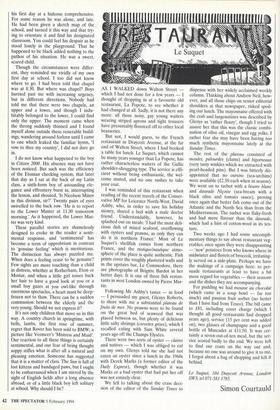Long life
Sentimental education
Nigel Nicolson
Did you happen to see last Friday a Channel 4 programme called Citizen 2000? It was one of a series about children born in 1982, and this episode described their traumas at switching from a primary to a secondary school, one of childhood's most turbulent watersheds.
The film was extraordinarily truthful and touching. With what delicacy the camera can probe mental suffering! The scene that moved me most was when a boy arrived for his first day at a hideous comprehensive. For some reason he was alone, and late. He had been given a sketch map of the . school, and turned it this way and that try- ing to orientate it and find his designated classroom. You could feel his despair as he stood lonely in the playground. That he happened to be black added nothing to the pathos of his situation. He was a sweet, scared child.
Though the circumstances were differ- ent, they reminded me vividly of my own first day at school. I too did not know where to go. I had been told that chapel was at 8.30. But where was chapel? Boys hurried past me with increasing urgency, but in different directions. Nobody had told me that there were two ,chapels, an upper and a lower, and though I indu- bitably belonged to the lower, I could find only the upper. The moment came when the throng suddenly thinned and I found myself alone outside these venerable build- ings, wandering around forlorn until I came to one which leaked the familiar hymn, 'I vow to thee my country', I did not dare go in.
I do not know what happened to the boy in Citizen 2000. His absence may not have been noticed. But such was the efficiency of the Etonian checking system, that later that day as I sat at the back of my Latin class, a sixth-form boy of astounding ele- gance and effrontery burst in, interrupting the lesson, and shouted, 'Is Nicolson Minor in this division, sir?' Twenty pairs of eyes swivelled to the back row. 'He is to report to the Lower Master at 11.30 tomorrow morning.' As it happened, the Lower Mas- ter was very kind.
These parallel stories are shamelessly designed to evoke in the reader a senti- mental response, and 'sentimental' has become a term of opprobrium in contrast to 'genuine feeling' which is meritorious. The distinction has always puzzled me. When does a feeling cease to be genuine? Few sights are more touching than a child in distress, whether at Rotherham, Eton or Mostar, and when a little girl tosses back her hair to have a good look at you or a small boy gazes at you owl-like through enormous spectacles, a heart must be deep- , frozen not to thaw. There can be a sudden communion between the elderly and the very young. Should we not express it?
It's not only children that move us in this way. A country church in springtime, with bells, lambs, the first rose of summer, regret that Rover has been sold to BMW; a picture like Vermeer's 'Mistress and Maid'. Our reaction to all these things is certainly sentimental, and our fear of being thought soppy stifles what is after all a natural and pleasing emotion. Someone has suggested
that it is a matter of class. The Sun is full of
lost kittens and bandaged paws, but I ought to be embarrassed when I am stirred by the sight of English fields after a long absence abroad, or of a little black boy left solitary at school. Why should I be?



















































 Previous page
Previous page